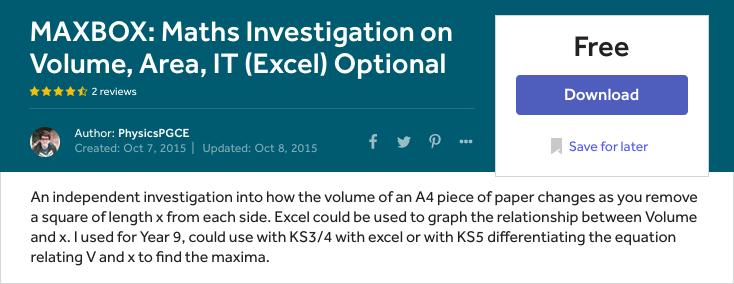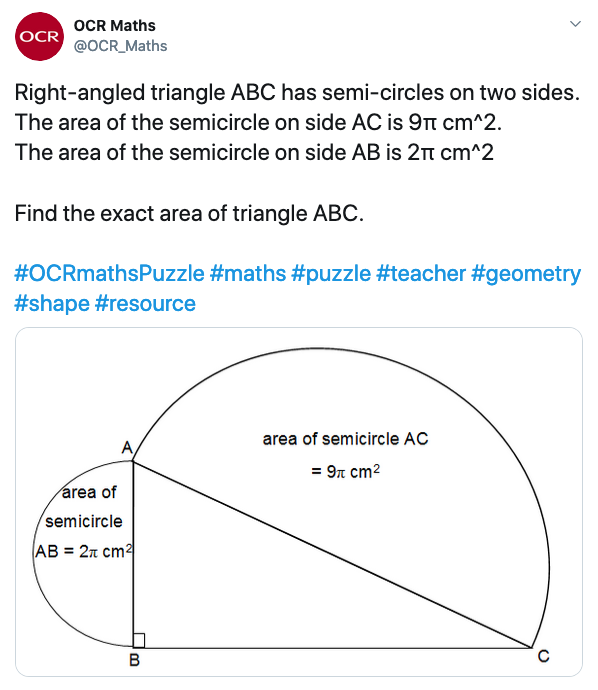Learning maths outside the classroom
30 March 2020
Hints and tips - 4 minute read
Steven Walker, OCR Maths Subject Advisor

The many recent advances in technology have led to much wider talk about the potential of students undertaking learning away from the teacher or classroom. Terms such as ‘flipped learning’ and ‘out of hours learning’ (or straight forward ‘independent learning’) are now common.
The recent school closures have now pushed online resources from being interesting alternatives to being lifelines. In this blog, I’ll look at some good quality free resources that students can use in times away from the classroom.
Use of technology
Students may be without a calculator at home, however, basic scientific calculators are available on most mobile phones. For those that would like more, free graphing and calculator apps are available from platforms like Desmos and Geogebra (as well as other providers). These platforms also crucially have a vast wealth of prepared tasks on different aspects of the curriculum, which students can readily explore from home.
Kinaesthetic learning
Kinaesthetic learning means learning through physical activities, also called tactile learning. While much equipment may be stuck back in the classroom, remember maths is regularly a practical subject and exploring maths around the house can help bring the subject alive.
Measuring and counting activities can be undertaken with little preparation. A range of free online resources available through sites such as TES Secondary mathematics resources allow different entry points, such as this MaxBox investigation on volume and area.
With whole families at home sharing equipment and bandwidth, practical investigations can also ease the pressure on technology and provide a break from screens.

Maxbox: Maths investigation on volume, area, IT (Excel) optional
Through @OCR_Maths Twitter account we’ve published many puzzles that students can easily find; search the #OCRMathsPuzzle hashtag. We’ll also be regularly posting links to a variety of online resources in the coming weeks, so do keep an eye on @OCR_Maths.

OCRmathsPuzzle 060320
The recent reform of GCSE (9 – 1) Mathematics and A Level Mathematics led to many new online resources being produced, but also fixed the content for all boards’ qualifications. This means resources produced over the last few years to support the reformed qualifications will be largely appropriate regardless of the final examination to be sat.
If using resources from overseas, students should be aware that they may use slightly different words (e.g. trapezoid instead of trapezium) or different measurement scales (e.g. cups as a unit of volume).
OCR maths support
We have published many free teaching resources that you can download now for GCSE, A level, Additional Maths, Core Maths and more. Just select your qualification from the ocr.org.uk/maths web page and then click ‘Planning and teaching’ from the menu on the left.
- Delivery Guides include teaching notes followed by many links to both OCR and third party resources.
- Section Check In tests and Check In tests are short sets of topic-based questions.
- Teaching activities are short activities and worksheets that can often be completed away from the classroom.
From ‘Assessment’ also on the left-hand menu, a selection of past papers as well as sample papers are available (the more recent past papers will remain locked for the time being).
Stay connected
There are so many great online resources available, so join the conversation by sharing your ideas and links to all your favourites, in the comment box below.
If you have any queries or questions, you can email us at maths@ocr.org.uk, call us on 01223 553998 or Tweet us @OCR_Maths. You can also sign up to subject updates and receive information about resources and support.
About the author
Steven Walker, OCR Maths Subject Advisor
Steven joined OCR in 2014 and has working on the redevelopment of OCR’s Entry Level, GCSE (9-1), FSMQ and A Level Mathematics qualifications. He now focuses mainly on supporting the Level 3 qualifications. Steven originally studied engineering before completing a PGCE in secondary mathematics. He is currently balancing his ‘work from home’ commitments with supporting his young daughter with reception year activities.
By the same author